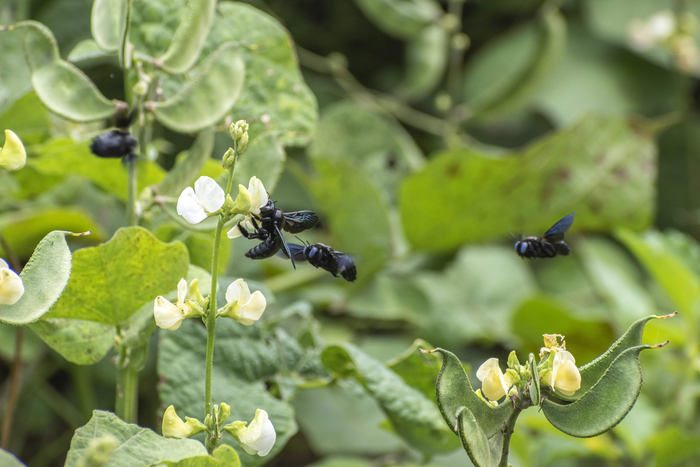Urbanization is a primary threat to biodiversity. However, scientists know little about how urbanization affects biodiversity and ecosystem services in tropical regions of the Global South. An international research team led by the Universities of Göttingen and Hohenheim in Germany, in collaboration with the University of Agricultural Sciences of Bangalore in India, investigated the effects of urbanization on bee communities in smallholder farms in and around Bangalore – a South Indian city with more than 13 million inhabitants. They found that social bees, such as wild honey bees, suffered more than large solitary bees or those that nest in cavities, which contrasts with results from temperate regions. Native flowering plants adjacent to farmland and crop diversification can help to maintain bee communities. The findings were published in the journal Ecological Applications.

Credit: Vikas S Rao
Urbanization is a primary threat to biodiversity. However, scientists know little about how urbanization affects biodiversity and ecosystem services in tropical regions of the Global South. An international research team led by the Universities of Göttingen and Hohenheim in Germany, in collaboration with the University of Agricultural Sciences of Bangalore in India, investigated the effects of urbanization on bee communities in smallholder farms in and around Bangalore – a South Indian city with more than 13 million inhabitants. They found that social bees, such as wild honey bees, suffered more than large solitary bees or those that nest in cavities, which contrasts with results from temperate regions. Native flowering plants adjacent to farmland and crop diversification can help to maintain bee communities. The findings were published in the journal Ecological Applications.
In an extensive field survey of bees on vegetable farms spread from rural to urban environments, the researchers recorded more than 26,000 individual bees belonging to 40 species. Combining the data with remote sensing by satellite allowed the scientists to identify how the proportion of sealed surfaces and buildings in metropolitan areas affected bee communities. They also analysed how bee species responded to the environments, comparing bees that use different nesting sites and differ in sociality and mobility.
“We demonstrated that the way bees responded to urbanization were specific to certain traits. For example, bees nesting in cavities actually benefited from urbanization as they can nest in small cracks and cavities on buildings,” says first author Gabriel Marcacci, PhD student in the Functional Agrobiodiversity group at the University of Göttingen. He continues, “Moreover, we found that ground-nesting bees, which are usually considered the losers in urbanization, find ample nesting opportunities in tropical megacities because enough bare ground is still available, mostly in the less developed neighbourhoods.”
Professor Ingo Grass, Department of Ecology of Tropical Agricultural Systems University of Hohenheim, explains: “Our results differ in part from what is often found in cities in temperate regions, which shows that we cannot generalize from field studies carried out in Germany or other countries of the Global North.” Another contrasting result is the strong decline of social bees with urbanization. “This result is particularly worrying because in the tropics, social bees – such as wild honeybees and stingless bees – form large colonies and are essential for crop pollination,” explains Professor Teja Tscharntke.
The study also revealed the positive effects on bee communities of farm management practices such as crop diversification, or the presence of wild native plants growing within and around vegetable fields. Professor Catrin Westphal, head of Göttingen University’s Functional Agrobiodiversity group, concludes, “Our results suggest that urban agriculture can promote bee communities if managed in a sustainable manner and could combine to support wild bee conservation and food production in and around cities”.
Original publication:, Marcacci, G., Grass, I., Rao, V. S., Kumar S, S., Tharini, K. B., Belavadi, V. V., Nölke, N., Tscharntke, T. & Westphal C. 2022. Functional diversity of farmland bees across rural-urban landscapes in a tropical megacity. Ecological Applications Doi: 10.1002/eap.2699
Contact:
Gabriel Marcacci
University of Göttingen
Faculty of Agricultural Sciences
Functional Agrobiodiversity
Grisebachstraße 6, 37077 Göttingen
Tel: +41 (0) 79 650 70 33
Email: [email protected]
www.uni-goettingen.de/en/617429.html
Professor Catrin Westphal
University of Göttingen
Faculty of Agricultural Sciences
Functional Agrobiodiversity
Grisebachstraße 6, 37077 Göttingen
Email: [email protected]
www.uni-goettingen.de/en/601841.html
Professor Ingo Graß
University of Hohenheim
Department of Ecology of Tropical Agricultural Systems
Garbenstrasse 13, 70599 Stuttgart
Email: [email protected]
Journal
Ecological Applications
DOI
10.1002/eap.2699
Method of Research
Observational study
Subject of Research
Not applicable
Article Title
Functional diversity of farmland bees across rural-urban landscapes in a tropical megacity
Article Publication Date
25-Jun-2022




